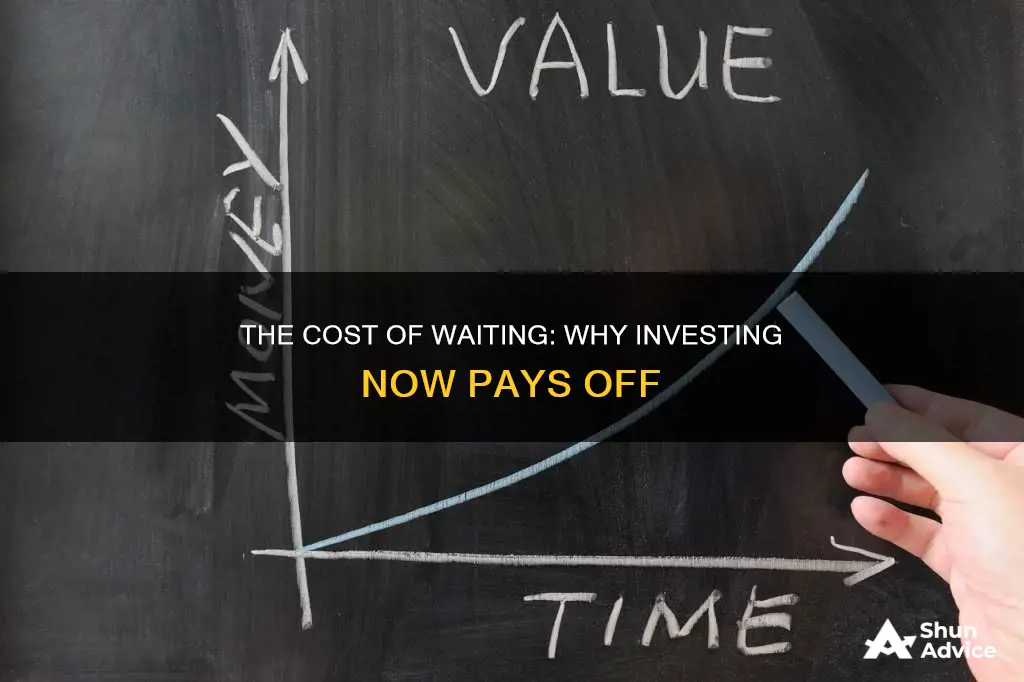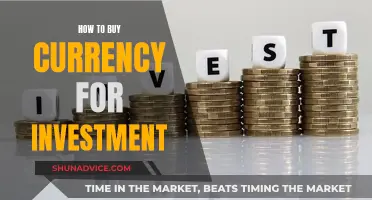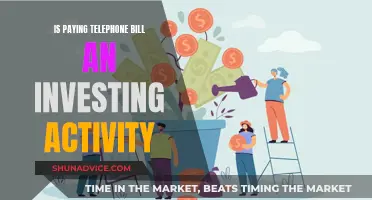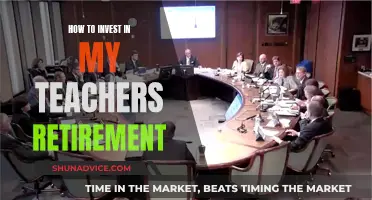
Waiting to invest can be costly. While it may be tempting to put off investing until you feel more financially secure or until the market recovers, doing so means missing out on valuable time to build wealth. Time is one of the most powerful tools when it comes to investing, and procrastination can silently kill your savings.
The power of compound interest means that the longer you wait to invest, the more money you could potentially lose out on. For example, consider two individuals, Jane and John, who both want to start contributing to a retirement fund. Jane starts contributing $2,000 annually at age 21 and does so for 40 years, while John waits until he is 41 and then contributes $4,000 per year for 20 years. Assuming a modest 4% rate of return, Jane ends up with $190,051, while John only accumulates $119,112—a difference of roughly $70,000.
Additionally, there is always a reason to delay investing, whether it's current events, economic uncertainty, or simply procrastination. However, history has shown that some of the biggest market rallies have occurred shortly after scary events. By waiting for the perfect time to invest, you may miss out on significant gains.
Therefore, while investing does carry inherent risks, the cost of waiting can be high. It's essential to understand the impact of compound interest and the potential opportunity cost of delaying investment decisions.
| Characteristics | Values |
|---|---|
| Time | The longer you wait, the more time works against you. |
| Procrastination | Putting off investing can be detrimental to your long-term financial plans. |
| Opportunity Cost | The cost of waiting to invest is often greater than the cost of investing. |
| Compound Interest | The power of compound interest can dramatically increase your wealth over time. |
| Risk | There is inherent risk in investing, but waiting to invest may also carry risks. |
| Timing | It is challenging to time the market, and trying to do so may result in missed opportunities. |
What You'll Learn

The cost of waiting to invest in stocks or bonds
When it comes to investing in stocks or bonds, time is of the essence. While it may be tempting to delay investing, whether due to market conditions, personal finances, or simply procrastination, the cost of waiting can be significant. Here are some reasons why waiting to invest in stocks or bonds can be costly:
Opportunity Cost: By waiting to invest, individuals incur an opportunity cost, forgoing potential gains that could have been achieved by investing earlier. Compound interest plays a crucial role in wealth accumulation, and delaying investment means missing out on the magic of compound interest working over time.
Lost Time: Time is a powerful tool in investing. The earlier one starts, the more time their investments have to grow and benefit from compound interest. As the saying goes, "The best time to plant a tree was 20 years ago. The second-best time is now."
Procrastination Penalty: Procrastination can be a silent killer of savings. The longer one waits to invest, the more it may feel overwhelming or intimidating to begin. This can lead to a cycle of inaction, resulting in lost opportunities and a smaller nest egg for retirement.
Market Timing Challenges: Trying to time the market by waiting for the "perfect" moment to invest is notoriously difficult. Historical perspectives show that some of the biggest market rallies occurred shortly after scary events or periods of uncertainty. Waiting for apparent stability or certainty before investing can result in missing out on potential gains.
Reduced Retirement Savings: Delaying investment, especially when saving for retirement, can have a significant impact on the final nest egg. Starting early allows for smaller, more manageable contributions over time, whereas waiting means having to play catch-up with larger contributions later on.
In conclusion, the cost of waiting to invest in stocks or bonds can be substantial. It is important to recognize the opportunity cost, the power of compound interest, and the value of starting early. While investing does carry inherent risks, sitting on the sidelines can also come at a price. As with most financial decisions, it is essential to carefully consider one's risk tolerance, investment goals, and time horizon before making any investment choices.
Diversity Pays Dividends: Unlocking Performance Through Inclusion
You may want to see also

The impact of compound interest on wealth
When it comes to building wealth, one of the biggest costs you will face is the cost of waiting to invest. Time is one of the most powerful tools at your disposal when investing. The earlier you start saving, the more compound interest can work in your favour, even with relatively small amounts.
Compound interest is interest that is calculated on both the initial principal and all of the previously accumulated interest. In other words, it involves earning interest on your interest. The power of compounding helps a sum of money grow faster than if simple interest were calculated on the principal alone. The higher the number of compounding periods, the greater the compound interest growth will be.
For example, let's consider two twins. One starts saving $100 a month at age 20, earning an average of 4% annually, compounded monthly across 40 years. By age 65, they will have earned $151,550 with a principal investment of just $54,100. The other twin doesn't begin investing until age 50. They invest $5,000 initially, then $500 monthly for 15 years, also averaging a monthly compounded 4% return. By age 65, they have only earned $132,147, with a principal investment of $95,000. Despite investing roughly twice the principal amount, the second twin has earned far less due to the power of compound interest.
Another example demonstrates the impact of compound interest on investment returns over the long term. Over 10 years, a $100,000 deposit receiving 5% simple annual interest would earn $50,000 in total interest. However, if the same deposit had a monthly compound interest rate of 5%, the interest would add up to about $64,700.
The long-term effect of compound interest on savings and investments is indeed powerful. It grows your money much faster than simple interest, making it a central factor in increasing wealth. It also helps to mitigate the impact of a rising cost of living caused by inflation. Therefore, when it comes to investing, it is essential to remember that time is of the essence, and the impact of compound interest on wealth cannot be overstated.
Code Investment: Maximizing Your Returns
You may want to see also

How procrastination hurts your financial goals
Procrastination can be detrimental to your financial goals and here are some reasons why:
Firstly, the cost of your financial goals increases with time. Every day that you don't save towards your goals is another day that you have to play catch-up. This is because the value of money is higher in the present than in the future. For example, if you were given the choice between $10,000 now or in three years, you would likely choose to take the money now. This is because you can use that money now to create future value through investing and earning compound interest. By waiting, you lose the opportunity to put that money to work for you and achieve your financial goals faster.
Secondly, procrastination often leads to missed opportunities. When you delay taking action, you may miss out on favourable market conditions or investment opportunities that could have helped your money grow. For instance, waiting for the "perfect" time to invest in the stock market could cause you to miss out on some of the biggest market rallies, which historically have occurred shortly after scary events.
Thirdly, procrastination can increase the cost of debt. When you make only the minimum payments on your debts, the interest accumulates, and you end up paying more in the long run. This leaves you with less money to invest and grow your wealth.
Finally, procrastination can lead to poor financial habits and a lack of financial literacy. When you put off creating a budget or understanding your finances, you may end up overspending, accumulating unnecessary debt, and missing out on opportunities to save. It's important to educate yourself and take control of your finances to ensure you're making the most of your money.
Adopting a positive attitude, setting realistic goals, and taking action, even if you feel unprepared, are crucial steps to overcoming procrastination and achieving your financial goals.
Investment Scams: Why the Fall?
You may want to see also

The opportunity cost of waiting to invest
When it comes to building wealth, one of the costliest mistakes you can make is to delay investing. While it may seem prudent to wait for the "right time" to invest, the truth is that time is one of the most powerful tools in investing. The longer you wait, the more you lose out on the potential for compounding returns, which can significantly impact your long-term financial goals, especially when saving for retirement.
Consider the example of Jane and John, both 21 years old and looking to start investing. Jane decides to open an individual retirement account and contributes $2,000 annually for 40 years, with a modest 4% rate of return. By the time she turns 61, Jane has accumulated $190,051. On the other hand, John decides to wait until he feels he can afford it and starts saving at 41 years old. He contributes $4,000 per year for 20 years, also assuming a 4% return. Despite his higher contributions, John ends up with only $119,112—a difference of about $70,000 compared to Jane.
The power of compounding interest is often underestimated. Even a one-year delay in investing can have significant costs. For example, an initial investment of $100,000 yielding 8% per year would result in forgone gains of 34% of the original investment after 20 years. The same investment with a 15% yield would cost you 213% of your original investment after 20 years.
Additionally, it's important to understand that the longer you wait to invest, the higher the returns need to be to make up for lost time. For instance, in the case of investing in a five-year Agency note at a yield of 3.70% versus remaining in a money market fund with a 2% yield, the investor would need to correctly predict both the timing and magnitude of an interest rate increase to come out ahead. The longer it takes for rates to rise, the harder it is to recoup the interest lost by waiting.
Waiting to invest can also impact your ability to take on risk. As people approach retirement, they may become more risk-averse and opt for more conservative investments. However, this can result in lower returns, further widening the gap between the potential gains of starting early and the reality of starting late.
In conclusion, the opportunity cost of waiting to invest is significant. By delaying investment decisions, individuals lose out on the potential for compounding returns and may find themselves struggling to catch up. As the saying goes, "The best time to plant a tree was 20 years ago. The second-best time is now."
Pyramid Schemes: Why the Appeal?
You may want to see also

The psychological barriers to investing
Investing is a challenging field, and just like in sports, natural talent is not enough for long-term success. A strong mental game is crucial to compete at the highest levels. Here are some common psychological barriers that hinder investment success:
Something from Nothing
Investing requires diligent work, including extensive reading and critical thinking. However, many people are drawn to financial markets by the prospect of making money with minimal effort. This desire for instant success without specialised knowledge often leads to speculative behaviour and financial losses.
Fight-Flight Response
When faced with investment challenges, emotional investors often exhibit a fight-or-flight response. They may either fight, doubling down in the hope of recovering losses, or flee, selling immediately without considering the fundamentals. During market crashes, this response can lead to panic selling, as seen in the 2008-2009 financial crisis, when many investors missed out on a prime buying opportunity.
Pain-Pleasure Response
Psychological studies show that people are twice as sensitive to pain stimuli as to pleasure stimuli. Similarly, an investor who speculates and loses money may associate the pain with stocks and avoid the market altogether, even though the error lay in the speculation rather than the stock market itself. This aversion to potential pain can cause investors to pass up profitable opportunities.
Natural Pattern Seekers
Humans have a tendency to seek patterns, which was a valuable skill in ancient times to avoid dangers. However, in investing, this can lead to overly simplistic strategies based on technical analysis or cheap assets, ignoring the underlying reasons for success.
Mistaking Correlation for Causation
Investors often fall into the trap of believing that certain calendar patterns or market trends cause changes in the market. For example, the "January effect" suggests that the market direction in January predicts the rest of the year, or the axiom "sell in May and go away" encourages investors to cash out in May. These beliefs are not based on causal relationships and can lead to missed opportunities.
Mistaking Uncertainty for Risk
Uncertainty and risk are often confused, leading investors to sell securities with high uncertainty. However, uncertainty has both upside and downside potential, while risk only has negative potential. Embracing investments with low risk and high uncertainty can lead to valuable opportunities.
Lack of Confidence and Knowledge
A significant psychological barrier to investing is a lack of confidence and knowledge about the process. Many people don't invest because they are intimidated or don't know where to start. They may also have misconceptions about the amount of money needed to begin investing, believing they lack the necessary funds. Overcoming these barriers through education and seeking professional guidance can empower individuals to take the first step into the world of investing.
Airline Investment: Profits Take Flight
You may want to see also
Frequently asked questions
The cost of waiting to invest is the loss of time, which is one of the most powerful tools when it comes to investing. Historical data shows that the market tends to recover and grow over time, so delaying investments due to short-term market fluctuations can result in missed opportunities and reduced long-term gains.
Procrastination can be a silent killer of savings. The longer you wait to invest, the more you may need to contribute later to catch up. Starting early allows you to take advantage of compound interest and grow your wealth over time.
People often hesitate to invest due to fear or uncertainty about the market. It's common to wait for the "perfect time" to invest, but this can result in missed opportunities. It's important to understand that there will always be market fluctuations and economic events that may cause concern. However, staying invested during these times can lead to greater returns in the long run.
Recognize that waiting for the perfect time to invest is unlikely to happen. Instead, focus on your long-term financial goals and consider working with a financial advisor to develop an investment strategy that aligns with your risk tolerance and goals. Diversification and a long-term perspective can help you navigate market ups and downs.







